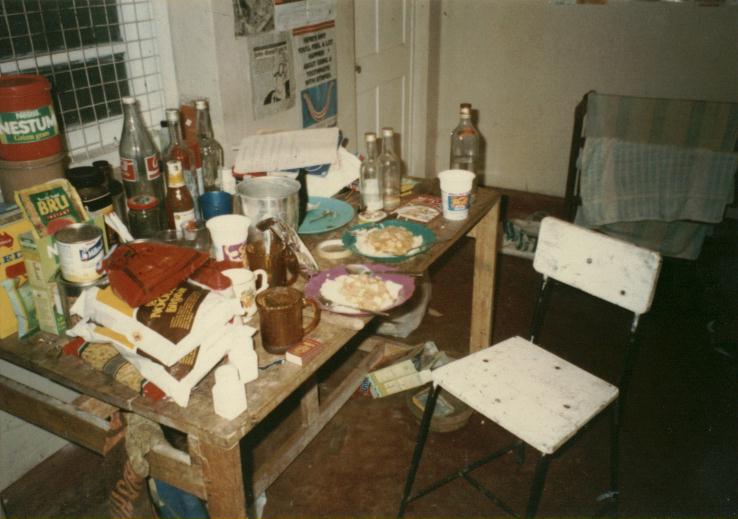Community Report - Batangala, and Our Lives There
The Batangala training centre is one of the many in Sri Lanka run by the National Youth Services Council. It is situated within about 6km of Avissawella, which is a medium sized town on the main road east out of Colombo. NYSC Batangala was established in 1972.
Ten different courses are run at Batangala, each in a vocational skill which is taught with practical and theoretical elements. There are around 100 students studying these ten subjects at any one time. Motor Mechanics, Welding, Woodwork, Metalwork, Woodcarving and Electrical Wiring are taught exclusively to boys; Dressmaking and Beauty Culture to girls only, and Catering and Agriculture are both mixed classes. The duration of these courses has altered while we have been here, but most last 6 months. Currently Motor Mechanics and Woodcarving are year-long courses, although Welding and Electric have also been in the past.
The students are, as mentioned, between 16 and 26 years old, with most being between 18 and 22. As dictated by the courses taught, the students are about 80% male and 20% female. They come from various backgrounds; some live nearby in the villages dotted around the Avissawella region while some live as far away as Matara in the South, or Trincomalee on the East Coast. Some have a handful of O- and A-level qualifications and hope to go on to 'higher education' while others aim to find employment with their vocational training upon completion of the courses.
Giles and I were given five of the sections each - my responsibilities being towards Metalwork, Welding, Woodwork, Motor Mechanics and Beauty Culture - and told when we were to teach. Just as the students' backgrounds are quite diverse, there has been quite a range in their knowledge of English. As we have taught them in their vocational sections, it was common to have one or two students in a class who could discuss things such as the differences between England and Sri Lanka in English, while some of their classmates would become glazed over with incomprehension soon after I'd said 'Good Morning'. Those who already had fairly good English, however, were quite a help; particularly when our Sinhala was very limited at the beginning, they could translate for the rest of the class.
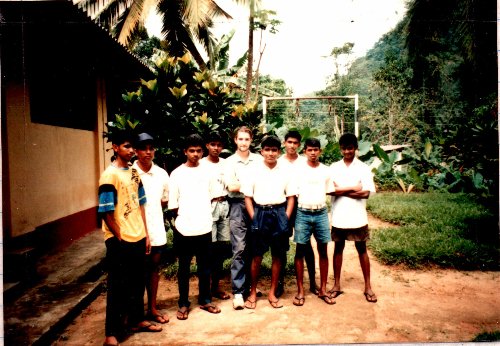
My 1995 Metalwork Section.
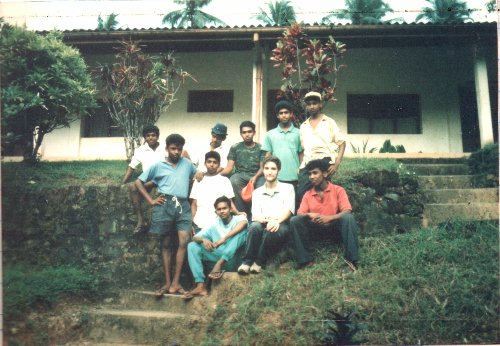
My 1995 Woodwork Section.
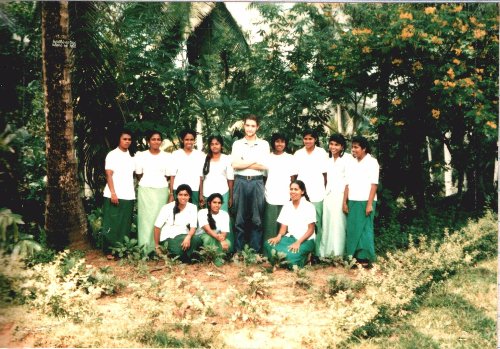
My 1995 Beauty Culture Section.
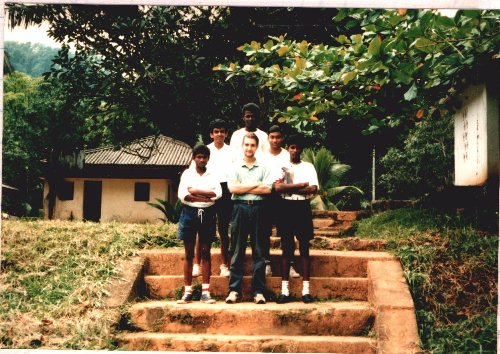
My 1995 Welding Section.
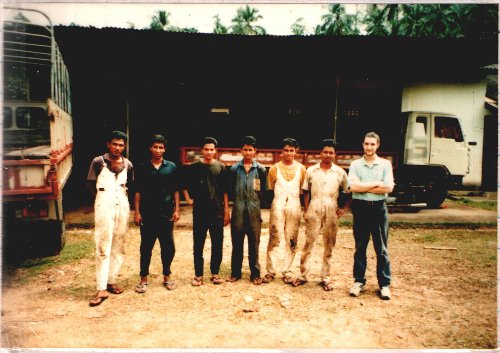
My 1995 Motor Mechanics Section.
The students reside at the centre for the duration of their courses, albeit with some holidays and visits home. The staff also almost all live onsite. As such, Batangala is its own isolated community. The students and staff all eat the same food, prepared in the large but remarkably bare kitchen. Many of the students and staff, thus, literally do not leave the gate to venture outside the centre for weeks at a time.
When they are not 'at their studies' in the classroom or practical rooms, the students are often to be found doing 'fieldwork'. This phrase is basically used to describe all manner of physical labour. Occasionally it seems like the students have been set tasks just to keep them busy, but in reality, the greenery and undergrowth around the centre advances with such alarming speed that it does need to be cut back very frequently if the centre is not to be reclaimed by the surrounding jungle. The students sometimes quietly bemoaned to us the amount of fieldwork they were forced to do, but in honesty they didn't often work extraordinarily hard (unless a senior member of staff happened to be close at hand!) I have sometimes been a little envious of them when the work looked more fun than hard toil, although on the occasions I have taken part myself it has been a bit of a waste of time; the students are unwilling to allow us to break into a sweat helping them, and considering we sometimes start to perspire just because we have walked from one classroom to another, this is quite prohibitive in terms of arduous work! Some would probably justify the seemingly excessive amount of fieldwork given to the students in terms of its 'character building' qualities - and I think I'd be inclined to agree.
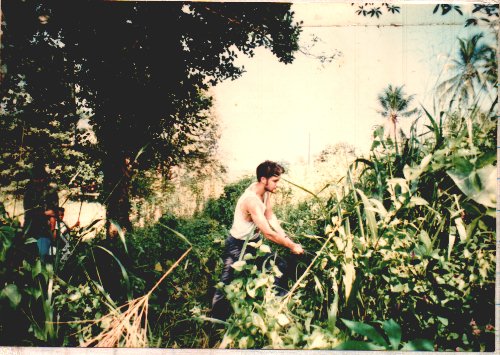
Me 'in a bunker' on the Batangala crazy golf course (helping with fieldwork actually).
One of the many activities which brought the whole centre together was the regular 'culture shows'. These took place once a month or more often. They were, at times, a strange mix of traditional Sinhalese and Kandyan dances, 'joke items' which were sketches written and performed by the students, and 'modern' song and dance - sometimes Indian Hindi songs which are popular in Sri Lanka. Added to this, at every culture show I was asked to sing and play my guitar, so Eric Clapton and Pink Floyd songs joined the cultural mixing pot!
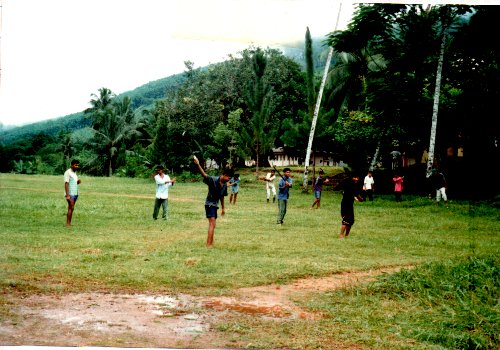
Some of the boys doing their fieldwork. These curved blades were used in the stead of a tractor lawnmower to trim the grass on the sports field. The cricket pitch's wickets are visible here.
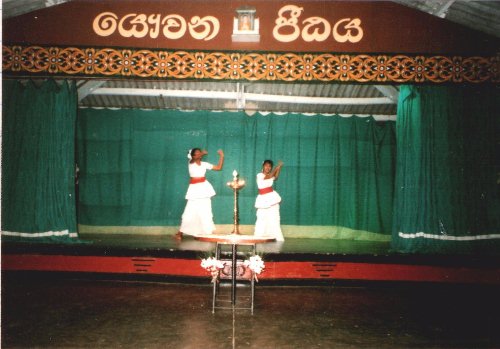
A culture show is started by two girls performing a graceful traditional dance. In the foreground, a brass ceremonial lamp is visible. This burnt throughout the culture shows.
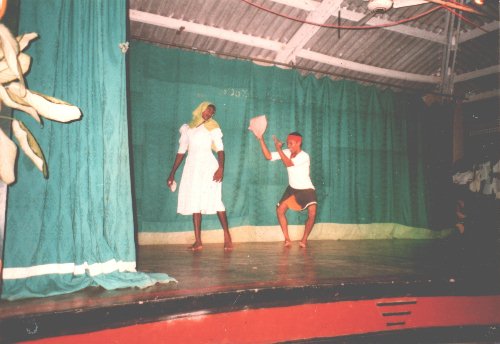
A 'joke item' in one of the culture shows. These were often funny for the wrong reasons, or not amusing at all, but this particular one was received with roaring laughter.
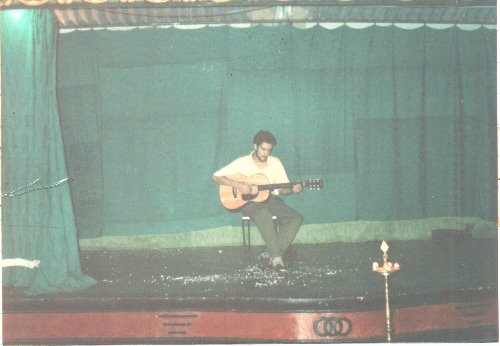
The staff and students didn't understand any of them, but were always very keen for me to perform some English song.
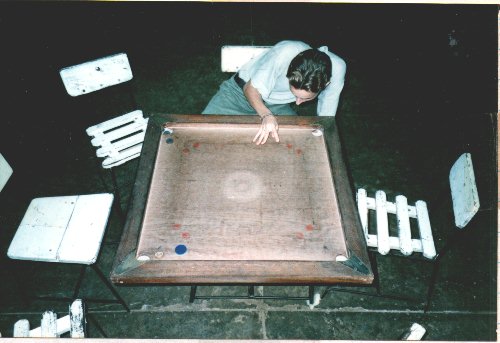
Another popular form of entertainment was 'carom', a game which is a little like a cross between pool and draughts. Here, Giles performs such a stunning shot that the students all flee in fear, leaving empty chairs behind them!
In general, life at Batangala was very quiet. It took a little while to adjust to the slow pace of life and the extremely relaxed atmosphere towards getting things done quickly. We soon, however, found the 'laid-backness' very pleasant. Often, once we had finished teaching, our evenings consisted of nothing but reading books, writing letters, going to the kitchen to eat dinner, chatting to the lads for a while afterwards, then returning to our quarters to read a few more chapters before bed. It was a very hassle-free lifestyle which we both came to appreciate; there's not really such a thing as 'stress' at Batangala. Apart from occasionally mischievous students, there was very little to worry about.

Our 1996 batch of students on parade. This preceded a 'sports day' which saw a diverse range of contests, from running races, to musical chairs (for 16-26 year olds!) and including competitions to see who could grate a coconut fastest, and 'pin the tail on the ...elephant!'
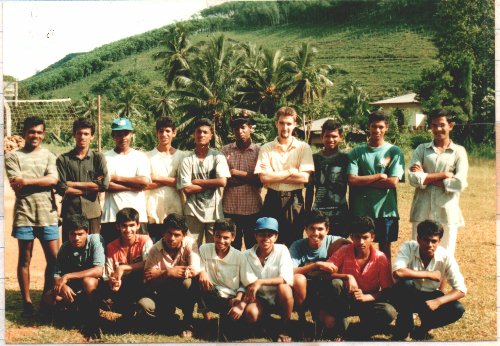
My 1996 Welding&Metalwork Section
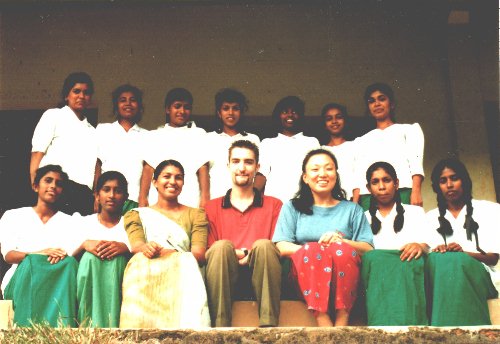
My 1996 Beauty Culture Section, their teacher and a Korean volunteer.
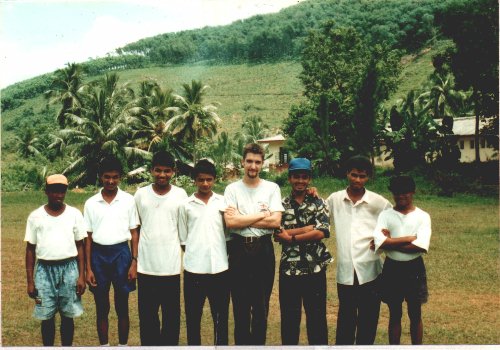
My 1996 Woodwork Section.
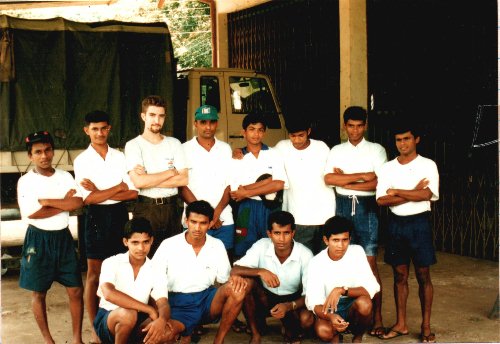
My 1996 Motor Mechanics Section.
The 1996 batch of students shown here were taught all the way through their 6 month courses by us. By the time they joined the centre in January, Giles and I were well settled in, and had more experience with teaching and a better knowledge of Sinhala. It was rewarding to see their progress during their courses, and see many of them do well in the exam we set for them in June. We were sad to see them leave after six months of being in such close contact with them for the duration of their courses. Many of them were very friendly, and there were some real 'characters' among them, who I think I shall miss.
At Batangala, Giles and I shared a bungalow with one or two other members of staff, and the Jayasiri family. It was perhaps only later on in the year that we came to appreciate how good it was to live with this family. When we wanted it, we had a fair degree of privacy and independence from them, but it was superb to have them there for advice, cups of tea and company at times. It wouldn't be an exaggeration to say that at times the two kids Anushka and Achinta, and Mrs Jayasiri brightened up our lives. It took a long time for Achinta, the little boy of 4 years old, to get the confidence to approach Giles and I, but once he did he was constantly knocking at our door to inform us that it was playtime! The two kids called Giles and I 'sudu ayee' (white uncle).
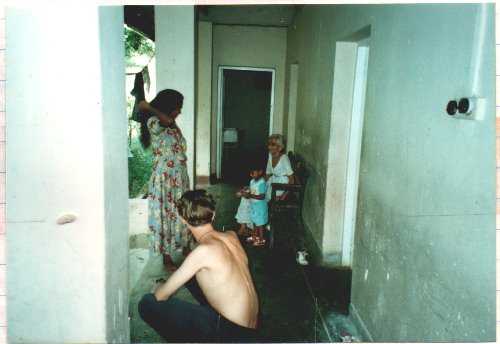
Giles with Mrs Jayasiri, little Achinta and Aachi (grandma) in their section of our shared bungalow.
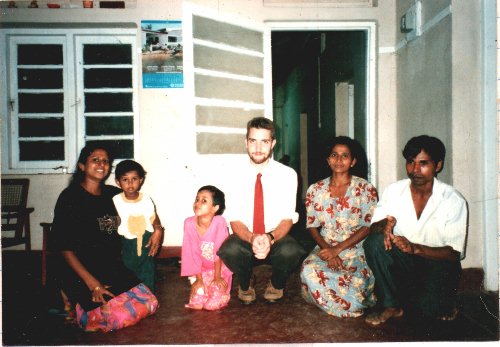
From Left to Right: Nandini, Achinta, Anushka, me, Mrs Jayasiri and her husband (smiler.)
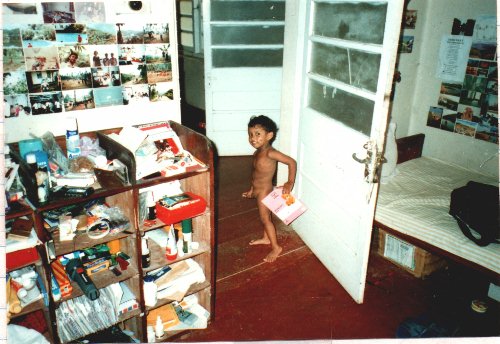
Achinta informs us that he's ready to play!
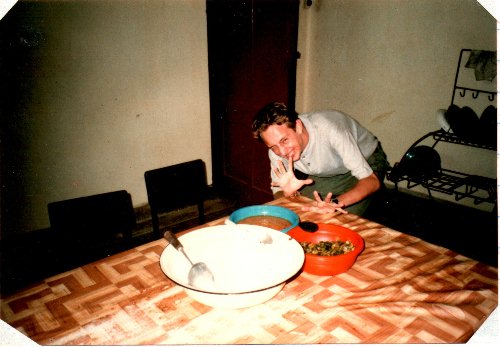
Giles appraises an evening's meal. It did take a while for us to be able to approach this dining room without being filled with dread.
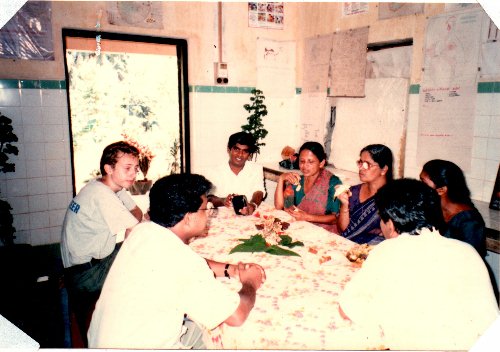
A somewhat more pleasant spread; this was a small party for the staff at the completion of our first set of 6 month courses.
There are several small villages surrounding Batangala, in the Avissawella region. Many of the non-teaching staff at the training centre lived in these villages; staff who worked in the kitchen or on the farm in the agriculture section. Occasionally we were invited to the houses of the cooks or farm-hands.
One very memorable function we were invited to was a party at the house of one of the cook's families. This was reasonably early on in the year, and our command of Sinhala was somewhat limited. As we left the centre in the evening, to walk the mile or so towards Avissawella to the party, we were given the impression that it was a celebration of a wedding or engagement by one of the watchmen in the gatehouse.
When we arrived at the house, we soon saw the young girl who we presumed to be the bride. The bridegroom, however, was not in evidence. We were quickly ushered into a very small room in which the men were guzzling cheap Arrak (a dubious alcoholic beverage distilled from coconut toddy.) It took us some time to realise the party was to celebrate the embarrassed young girl's 'coming of age'. Presumably the watchman had meant that the girl was now ready to be married.

Myself engaging in 'men's talk' over a glass of rocket fuel (cheap Arrak.)
This was one of many occurrences which brought home to Giles and I how important language is as an interface to your environment. Without a good understanding of Sinhala, and with few people at the centre with an extensive knowledge of English, we were often to be found in a state of bewilderment as to what was going on around us. It was very rewarding as our Sinhala improved to gradually be able to understand more and more about Sri Lankan customs and traditions as well as simply being able to hold basic conversations.
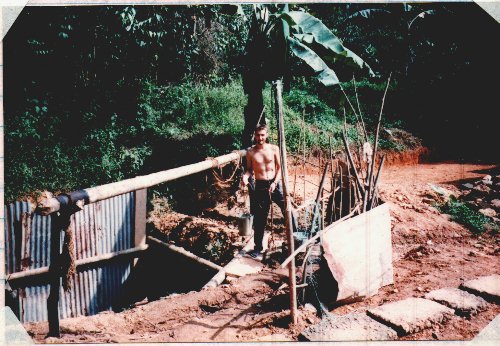
When the well pictured [in Initial Impressions] was demolished for no clear reason, and we were told a new one would be built within the next two months, Giles and I joked about how we might just see it finished before we went home. We seem to have picked up a good deal about the way things were done at that early stage; that was in November '95, this picture was taken around April '96. Ironically, the new well was completed during our last few weeks in the country.
Having said that my initial impressions of Batangala as a stunningly beautiful place were gradually but rapidly replaced by feelings of unease, and even dislike, it didn't stay that way for long. As I asserted when discussing culture shock, unfamiliarity often seems to produce feelings of suspicion and discomfort. However, when we began to understand more about the things around us which at first seemed strange, and we became more able to actively participate, rather than always being bemused observers, it became easier to appreciate the good things about Batangala.
At Batangala, we were treated with respect - whilst locals of our age are often still treated as children, and granted little freedom and independence, we were recognised as responsible individuals. We seemed to be looked upon favourably by students and staff.
Although at first it was a little daunting to be given so little guidance as towards our duties, we later came to be glad of the freedom it afforded us. Our style and methods of teaching developed largely through trial and error, albeit employing fairly educated guesses as to what approach to take. It was very rewarding to see our students' standard of English improve, as our teaching and our Sinhala also progressed.
In the last few months of our time at Batangala, we felt very at home, and widely accepted by the whole community. We had built up relationships of sorts with local shop keepers, bus conductors and many others, including hoards of children who would follow us up and down the road, practicing their English and exchanging toffees and fruit with us.
Batangala was a very peaceful, relaxing place to live. We came to look upon the bungalow we shared with the Jayasiris as our home, rather than just the place we stayed. It was always nice to get 'home' after a spell of travelling.

